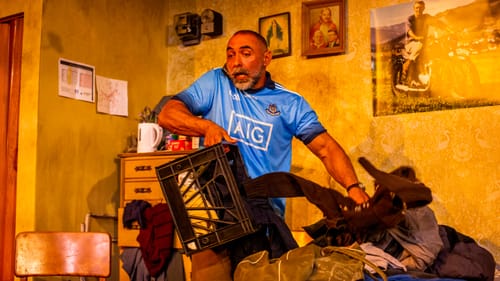Stay in the Loop
BSR publishes on a weekly schedule, with an email newsletter every Wednesday and Thursday morning. There’s no paywall, and subscribing is always free.
The pain we give ourselves
Inis Nua Theatre Company presents Conor McPherson’s ‘The Night Alive’

Inis Nua Theatre Company may be Philadelphia’s premier purveyor of contemporary Irish drama, but it has strangely neglected the works of Conor McPherson, who is arguably that country’s most notable living playwright. The Night Alive, a ruminative consideration of alienation and affection in modern-day Dublin that opens the company’s 16th season, represents its first crack at McPherson’s corpus. The show doesn’t prove to be worth the wait.
Sans ghost story
McPherson’s best plays, like The Weir and Shining City, use the frame of a ghost story to mine the darkest corners of the human mind. In those works, he displays a singular ability to evoke the supernatural without the slightest hint of hokum or cheap thrill. But The Night Alive deals only with the pain human beings inflict on themselves—which, in some ways, is scarier than any horror movie.
Yet without his regular narrative device, McPherson stumbles in his attempt to strike a balance between humor and heartache, and he exhibits an overreliance on talkiness and familiar Irish clichés. That inconsistency of tone manifests itself in director Tom Reing’s sluggish, variably acted production. The characters seem appropriately rootless and under a constant cloud of danger, but their interactions don’t add up to much cumulative connection.
Tommy and Aimee
You-Shin Chen’s set design—a crumbling bedsit strewn with trash bags and takeout containers—certainly telegraphs the rudderless world that McPherson’s down-and-out denizens inhabit. The play opens with Tommy (Andrew Criss), a hard-living handyman stumbling uncomfortably through middle age, ushering Aimee (Minou Pourshariarti) into his dark reality. Tommy is in a mostly unexamined, self-imposed exile from his wife and children, existing in the company of his own demons. In Aimee, he has clearly found a kindred spirit of the lost-soul variety.
This scenario holds the possibility for plenty of familiar theatrical devices. An attraction brews between Tommy and Aimee, although it’s never fully explained what charges their bond. Is it just that Tommy shows her compassion, as he does everyone in his orbit? McPherson populates his world with strays, including Tommy’s bumbling coworker Doc (Mike Dees) and his widowed uncle Maurice (Michael P. Toner), who spends much of the play considering his own mortality. The long, plodding first hour hews to the workings of a standard-issue love story.

Broken halves
McPherson seems interested in exploring how lonely people are drawn together, even as they simultaneously resist forming attachments. Such storytelling calls for a healthy dose of subtext, which Reing’s production lacks. Tommy and Aimee talk around their problems, but the obfuscation doesn’t feel infused with a sense of how two broken halves could come together and form a satisfying whole. The burgeoning relationship is too often interrupted by broadly comic scenes between Tommy and Doc—as played by Criss and Dees, they resemble the kind of fusty English sitcoms that PBS used to air on Saturday nights.
The play’s second hour introduces a fifth character, played with a touch too much menace by Grant Struble, who feels like an over-obvious nod to the street toughs that populate the world of another current giant of Irish theater, Martin McDonagh. The overall script extends well beyond its natural life, with several false endings and the same points made multiple times. It should be clear to anyone who has followed McPherson’s career that The Night Alive is not his strongest work, but the production does it few favors—the storytelling is rarely steady and seamless.
“What’s going on?”
Dees and Toner still manage to craft satisfying overall performances, even within somewhat stereotypical frames. (Maurice, in particular, is the kind of whiskey-tinged philosopher who can be found in the pages of every Irish playwright from Sean O’Casey to Marina Carr.) Pourshariarti also pushes Aimee out of the familiar woman-in-peril realm. Criss, on the other hand, seems too stolid and placid to fully convey the inner workings of a man who is always perilously close to combustion.
Midway through the play, Tommy, Aimee, and Doc randomly break into a fit of dancing while listening to Marvin Gaye’s “What’s Going On?” Their exuberance is unexplained. I won’t be surprised if you find yourself asking what’s going on more than once during this disappointing drama.
What, When, Where
The Night Alive. By Conor McPherson. Directed by Tom Reing. Inis Nua Theatre Company. Through October 27, 2019, at the Louis Bluver Theatre at The Drake, 302 S. Hicks Street, Philadelphia. (215) 454-9776 or inisnuatheatre.org.
The Louis Bluver Theatre is an ADA-compliant venue with gender-neutral restrooms.
Sign up for our newsletter
All of the week's new articles, all in one place. Sign up for the free weekly BSR newsletters, and don't miss a conversation.

 Cameron Kelsall
Cameron Kelsall